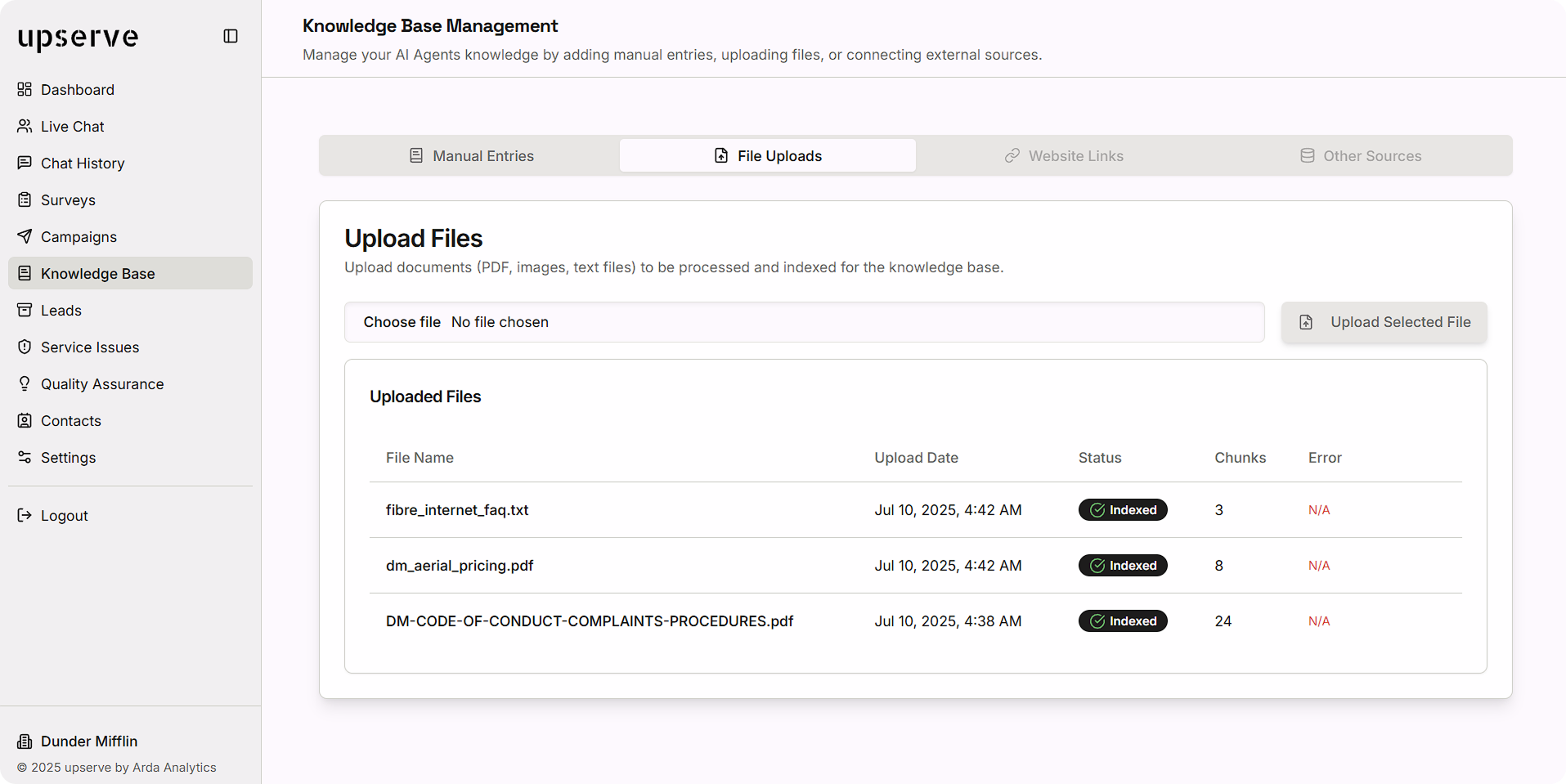If you’ve ever tried to scale customer support, you know the biggest challenge isn’t just hiring more people, it’s making sure customers always get accurate answers, fast. That’s where a knowledge base comes in.
When paired with AI agents, your knowledge base becomes the backbone of an automated support system: it ensures that the answers your customers get are consistent, helpful, and available 24/7.
The good news is, you don’t need to be technical to set one up. On upserve, businesses can simply upload documents, FAQs, product details, or even rely on past conversations, and the AI agent will learn to handle routine queries with ease.
Why a Knowledge Base Matters for AI Support
Think of your knowledge base as your company’s collective memory. It holds all the “stuff” your team knows, answers to common questions, step-by-step processes, product information, and policies. Without it, AI agents are flying blind.
Here’s why it matters:
- Consistency: Every customer gets the same clear, accurate answer.
- Speed: AI can instantly retrieve information, reducing wait times.
- Scale: Your team doesn’t have to repeat themselves hundreds of times.
Best Practices for Building an AI-Friendly Knowledge Base
1. Keep It Clear and Simple
Avoid jargon. Write answers the way you’d explain them to a customer directly. For example, instead of “Our SLA outlines response windows,” say “We reply within 24 hours on weekdays.”
On upserve, when you upload files or product details, the AI uses plain-language patterns to respond in a way that feels natural to your customers.
2. Organize by Customer Needs
Don’t think of your knowledge base as a filing cabinet. Think of it as a map for your customer’s journey. Group information around the problems they’re trying to solve:
- “How do I book an appointment?”
- “How do I earn or spend points?”
- “What happens if my internet goes down?”
This makes it easier for the AI to match real-world customer queries with the right answers.
3. Leverage Past Conversations
Your customers are already telling you what belongs in your knowledge base, they’re asking the same questions over and over. upserve captures these recurring themes from live chats and uses them to auto-enrich the knowledge base.
That way, your AI agents get smarter over time, without you needing to manually feed them every update.
4. Keep It Up to Date
A knowledge base isn’t a one-time project, it’s a living asset. Old or incorrect answers frustrate customers and damage trust.
On upserve, you can easily refresh your AI agent by uploading updated files, editing FAQs, or even letting surveys and customer feedback automatically improve your knowledge base.
5. Balance Automation with Human Touch
Even the best AI agent won’t have every answer. That’s why upserve is designed with seamless human handoff. If the AI can’t resolve an issue, it passes the conversation to your team, along with the full context, so your staff picks up right where the AI left off.
Final Thoughts
Building a knowledge base for AI agents doesn’t have to be technical or overwhelming. Think of it as teaching your business’s best employee everything they need to know, only this one works 24/7, across WhatsApp, Messenger, and Web Chat.
With upserve, all you need to do is:
- Upload your files, FAQs, and product info.
- Let the platform learn from past customer conversations.
- Keep it fresh with regular updates and feedback loops.
Done right, your knowledge base becomes the foundation for smarter, faster, and more personal customer support.
Next in the series: Structuring Your Knowledge Base for AI Agents - Part 1.
Need help preparing your knowledge base? Book a discovery call with the team 👉 [email protected]




